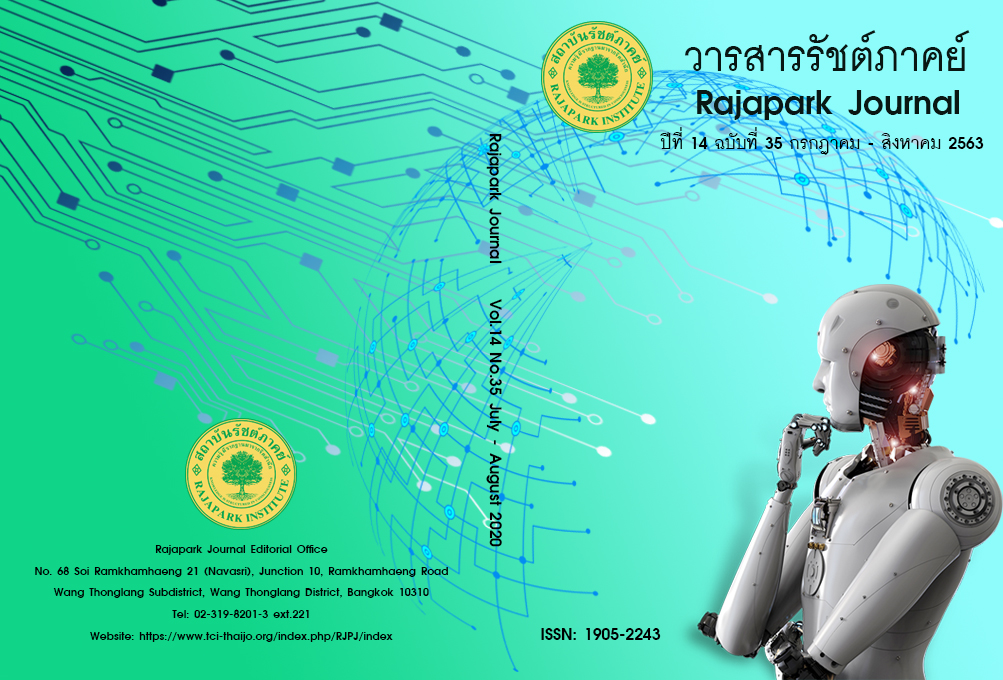Increased Penalty for an Action That Arises by Hatred to People Who Have an Unmatched Sexual Identity with Its Congenital
Main Article Content
Abstract
The purposes of this study were to examine hate crimes caused by individuals who demonstrate different gender identities and the attitude of acceptance of individuals who exhibit different gender identities. The study was a qualitative research model from the study of legal documents, related laws analyze and present descriptive. The results showed that to make their sexual identities and congenital gender matched. The most concern is the violated action to the rights of life and body which continually increased to the level that crime is committed by the hatred toward those people. Regarding the aforesaid problem, Thailand has no law to indicate such criminal liability which is now in the recognition of the world society. Therefore, it is suggested that the reasons and necessity to those problems should be studied, including concepts and theories of indicating criminal liability for the action that arises from the hatred to people who have an unmatched sexual identity with its congenital. In order to do so, foreign laws shall also be studied to analyze the extent and pattern to indicate criminal liability, offenses element and exceptions to adapt into Thai laws.
Article Details
Views and opinions appearing in the Journal it is the responsibility of the author of the article, and does not constitute the view and responsibility of the editorial team.
References
Barkan, S. E., & Bryjak, G. J. (2004). Fundamentals of Criminal Justice. Boston: Pearson Education, Inc.
Duangwises. N. (2010). The gay movement in Thai society. Laboratory and paradigm. Doctor's thesis Social Administration Faculty of Social Sciences. Thammasat University.
Gender Equality Act, B.E. 2558 (2015)
Gerstenfeld, P. B. (2013). Hate Crimes: Causes, Controls, and Controversies. Los Angeles: SAGE Publications.
Herek, G. M. (1994). Heterosexism, hate crimes, and the law. In M. Costanzo & S. Oskamp (Eds.), Claremont symposium on applied social psychology, Violence and the law, 7, 89–112. Sage Publications, Inc.
Jackson, P. A. & Cook, N. M. (1999). Gender and sexualities in modern Thailand. Chiang Mai, Thailand: Silkworm Books.
Matsuda, M. J., Lawrence III, C. R., Delgado, R., & Crenshaw, K. (1993). Words That Wound: Critical Race Theory, Assaultive Speech, and The First Amendment. Boulder: Westview Press.
Mgronline. (2019). Orlando gay nightclub shooting: 50 killed. Retrieved 20 August 2019, from https://mgronline.com/uptodate/detail/9590000058905
Michelle, A. Marzullo, & Alyn J. Libman. (2009). Hate Crimes and Violence Against LGBTQ People. Retrieved 20 August 2019, from https://www.hrc.org/resources/hate-crimes-and-violence- against-lgbt-people
OSCE Office for Democratic Institutions and Human Rights (ODIHR). (2009). Hate Crime Laws: A Practical Guide. Retrieved 20 August 2019, from https://www.osce.org/odihr
Potiwan, P. (2011). Identity, Sub-Cultural and Social Space of the Transgender. Damrong Journal of The Faculty of Archaeology Silpakorn University, 10(1), 98-125.
Pridasawas, P. (1987). Self-care and social and cultural perspectives. Center for Health Policy Studies. Mahidol University.
Rathamarit, U., Suriya, N., & Singkaneti. B. (2001). Human Dignity or Human Rights and Freedom in Section 28 Under the Constitution of The Kingdom of Thailand, B.E. 1997, The Constitutional Court of the Kingdom of Thailand, 76-77.
Saengmaneejeeranandacha T., & Sonsuphap, R. (2019). Equality of the LGBT to Marriage and Child Legalization in Thailand: in the Viewpoint of Scholars and Social Activist. Journal of Humanities and Social Sciences, Rajapruk University, 5(2), 1-18.
Yaimanee, L. (2020). Hate Crimes: Crime of Prejudice in Social Dynamics, Journal of Criminology & SOC-ANT. 3(2).


